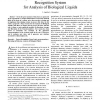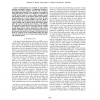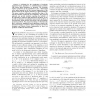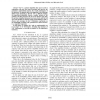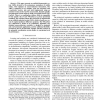112
click to vote
CEC
2008
IEEE
15 years 2 months ago
2008
IEEE
Given the great amount of data that are generated of the experiments to analyze information of extracted chemical fluids of the brain of a rodent, arises the necessity to design an...
140
click to vote
CEC
2008
IEEE
15 years 2 months ago
2008
IEEE
Abstract-- Understanding the evolvability of simple differentiating multicellular systems is a fundamental problem in the biology of genetic regulatory networks and in computationa...
124
click to vote
CEC
2008
IEEE
15 years 3 months ago
2008
IEEE
— A technique for the visualization of stochastic population–based algorithms in multidimensional problems with known global minimizers is proposed. The technique employs proje...
122
click to vote
CEC
2008
IEEE
15 years 3 months ago
2008
IEEE
This paper proposes an approach to the solution of multi-objective optimisation problems that delivers a single, preferred solution. A conventional, population-based, multiobjectiv...
CEC
2008
IEEE
15 years 4 months ago
2008
IEEE
137
click to vote
CEC
2008
IEEE
15 years 4 months ago
2008
IEEE
Abstract-- In this paper we investigate the effects of individual learning on an evolving population of situated agents. We work with a novel type of system where agents can decide...
125
click to vote
CEC
2008
IEEE
15 years 4 months ago
2008
IEEE
Abstract-- This paper presents an artificial homeostatic system (AHS) devoted to the autonomous navigation of mobile robots, with emphasis on neuro-endocrine interactions. The AHS ...
133
click to vote
CEC
2008
IEEE
15 years 4 months ago
2008
IEEE
Abstract-- We investigate the usefulness of a subtree deactivation control mechanism which is open to evolutionary learning. It is hypothesised that this representation confers an ...
131
click to vote
CEC
2008
IEEE
15 years 4 months ago
2008
IEEE
It is often suggested that traditional models of artificial evolution, based on explicit, human-defined fitness functions, are fundamentally more restricted and less creative than ...
137
click to vote
CEC
2008
IEEE
15 years 4 months ago
2008
IEEE
In this paper, we present Creature Academy, a virtual laboratory that allows for the evolution of form and function within simulated physical 3D environments. Creature Academy can ...
